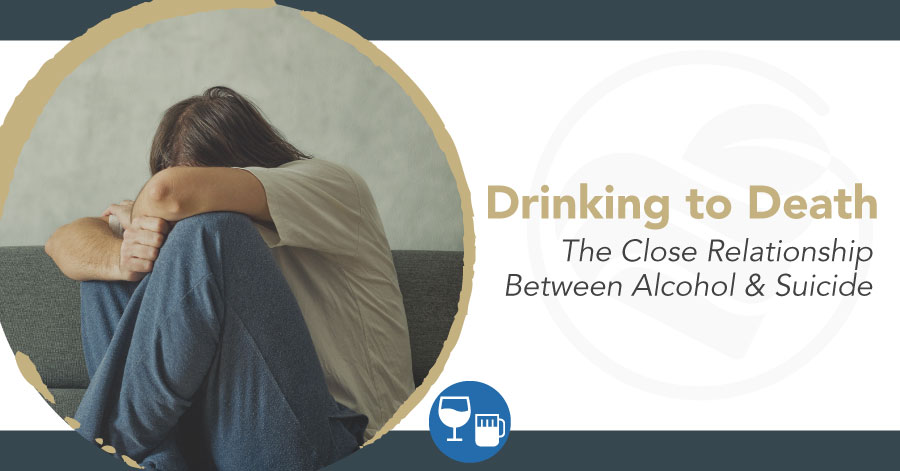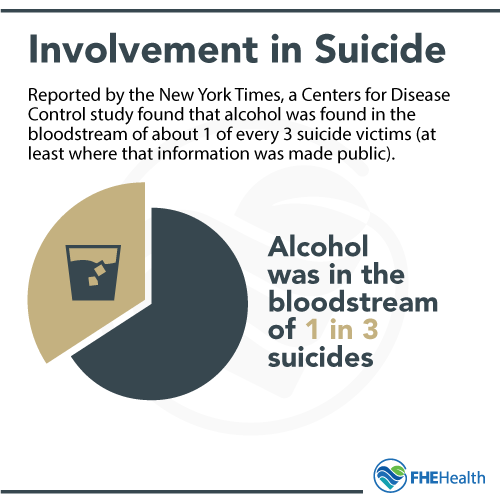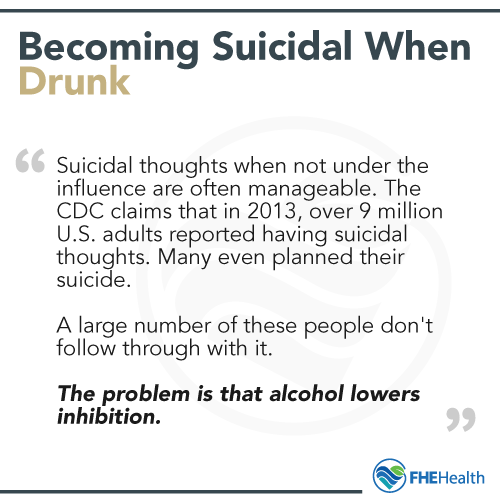
What happens when someone struggling with anxiety, depression or another mental health condition takes part in problem drinking behaviors as a way to escape? According to the evidence, their risk of suicide is never higher than it is in this case.
Let’s examine some of the stats:
Reported by the New York Times, a Centers for Disease Control study found that alcohol was found in the bloodstream of about 1 of every 3 suicide victims (at least where that information was made public).
The U.S. Department of Health and Human Services found that in places where the minimum legal age to consume alcohol was lower, the suicide rate for young adults was higher.
Heavy drinkers are five times more likely to attempt suicide than light or social drinkers, according to one study.
Clearly, the link between drinking alcohol and thoughts or attempts of suicide is stronger than we might have previously thought. Here is a discussion of why this connection exists, and why it’s so important to get help with your mental health struggles or addiction.
The Inherent Effects of Alcohol

The answer to why alcohol seems to activate suicidal tendencies lies in the classification of the substance.
Alcohol is a depressant, meaning that it suppresses functions of the central nervous system and allows the user to dissociate from their life. This is why many people drink to escape grief, pain, guilt and other negative emotions. Unfortunately, these negative emotions are also tied in with mental illness, and consumption of alcohol can worsen depression.
An article from The Guardian explains the complex way in which we interact with alcohol. For many struggling with depression, the influence of alcohol can produce immediate euphoria. This can be a welcome relief when someone is feeling hopeless.
After this initial burst of good feelings, however, alcohol makes us feel worse than we did before. Experts suggest the cause may be that the symptoms of alcohol intoxication are very similar to those of depression and may make it feel like the depression is worsening the more we drink.
But depression is one thing, and suicide is another. In the United States, 16% of the population suffers from depression, a rate higher than the U.S. suicide rate. What makes some people turn to suicide when they consume alcohol?
Changes to Impulsive Tendencies (Short-Term)
Alcohol is proven to worsen impulsive behavior due to its effect on the prefrontal cortex, the part of the brain that controls executive functions, including common sense and short-term decision-making. This can lower the barriers to doing something difficult, and there’s more of a chance a person will act on a decision that they would spend more time thinking about if they weren’t under the influence.
Nearly everyone who has experimented with alcohol understands what it’s like to wake up after a night of drinking and learn that they made a choice they’d never make while sober.
The Effects of Alcoholism on Decision-Making (Long-Term)
Over time, alcoholism affects decision-making, probably due more to a change in self-esteem than acute changes in brain function. Addictive substances literally change the way the brain functions, rewiring a person’s risk/reward system.
This changes the person’s behavior and the factors they prioritize when making decisions. It may lead them to care about nothing else but the next high (or drunk), and in between these periods of escapism, experience intense lows.
Becoming Suicidal When Drunk
Suicidal thoughts when not under the influence are often manageable. The CDC claims that in 2013, over 9 million U.S. adults reported having suicidal thoughts. Many even planned their suicide.
A large number of these people don’t follow through with it. They get professional help and realize that there are better ways to cope. They think through the pros and cons of their actions and decide that they still have things to offer the world.
For most people, there’s a sizable channel in between thoughts of suicide and putting plans into action.
The problem is that alcohol lowers inhibition. Long-term consumption rewires the decision-making center of the brain. That space between thinking about suicide and actually doing it shrinks, and someone who is both drunk and experiencing suicidal thoughts may make an impulse decision to end their life.
Using Alcohol as a Vehicle for Suicide
 It’s true: More Americans are drinking themselves to death than ever before, but liver disease from heavy drinking isn’t the same thing as purposely drinking enough to die in a single session.
It’s true: More Americans are drinking themselves to death than ever before, but liver disease from heavy drinking isn’t the same thing as purposely drinking enough to die in a single session.
Suicide by alcohol overdose is a lot less common. According to the CDC, six people per day die of an alcohol overdose (alcohol poisoning) in the United States.
The problem, however, is that it’s nearly impossible to distinguish those who did this on purpose from those who did it by accident. Say you had someone close to you who was depressed and died from alcohol poisoning. How can you tell if it was meant to be a way to take their life or just the consequences of heavy drinking to escape bad thoughts and feelings?
Suicide Using Alcohol in Combination with Other Substances
Prescription drugs are also commonly seen in overdose deaths, and there are likely more suicides in which both pain pills (opiates) and benzos and alcohol are the culprits. The CDC reports that 6.1 in 100,000 men died of an overdose involving prescription medications in 2017.
What’s the Solution?
As with many mental health issues, one of the keys to lowering the number of people who commit suicide while drinking alcohol is to raise awareness. Diseases like depression are extremely pervasive, and people suffering often turn to alcohol to self-medicate rather than seeking treatment.
FHE Health treats both substance use disorders like alcoholism and mental health conditions like depression with a specialized approach to co-occurring conditions. To learn more, contact FHE Health and help us prevent the growing epidemic of suicides in the United States.









